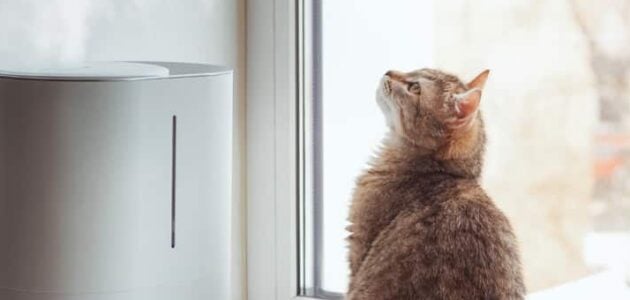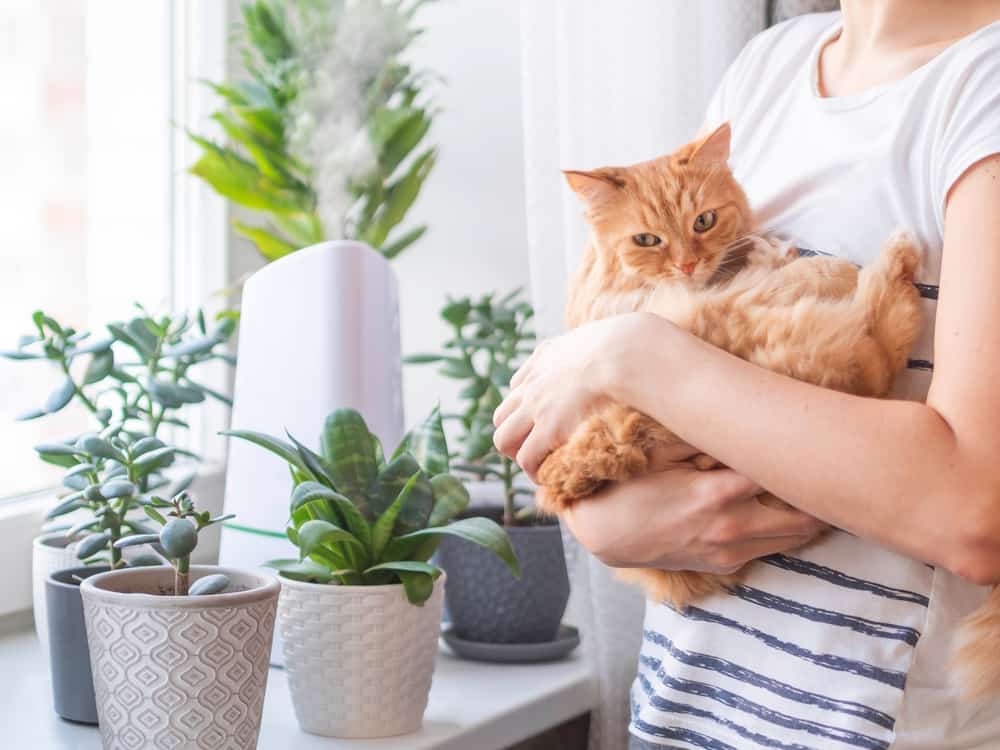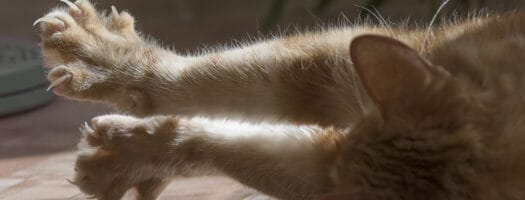Humidifier for Cats: What You Need to Know

Humidifiers are popular amongst humans to relieve dry air, treat colds and respiratory issues, and as a part of aromatherapy when used with essential oils. However, cats may also benefit from the presence of a humidifier in certain conditions.
If you have a cat that needs some special care, you’re dealing with a kitty cold, or you simply want to ensure your cat will be safe with a new humidifier, you’re in the right place. Read on to learn everything you need to know about humidifiers for cats.
What Does a Humidifier Do?
A humidifier is a device that works to increase moisture in the air by pulling in dry air, mixing it with moisture within the humidifier, and then misting out the humid air. Humidifiers range in size from small and desk-sized units to large units that take up quite a bit of space. Generally, the larger your humidifier is, the more powerful you can expect it to be.
In humans, humidifiers are the most beneficial for aromatherapy (when combined with essential oils) and for relieving the symptoms of colds or respiratory issues. They also might help to combat allergies, dry coughs, and issues with dry skin.
It’s important to take care of your humidifier and clean it regularly to prevent mold and bacterial growth that might contaminate the air of your home via the mist your humidifier puts out.
Are Humidifiers Beneficial for Cats?
Similar to how they help with human problems, humidifiers can benefit cats that are suffering from colds, respiratory issues, allergies, and dry skin. You may be able to bring a humidifier into your home if you notice your cat suffering from certain health issues, or a veterinarian may suggest a humidifier to help with your cat’s health problems.
If you are bringing in a humidifier for your own health issues, it is unlikely to have any negative effects on your cats as long as you are following proper safety precautions (we touch on this more below).
Cat Conditions Which Might Require a Humidifier
The following cat health conditions may require the use of a humidifier to help relieve symptoms and ensure your kitty companion feels their best. Make sure that you are always following the guidance of a veterinarian when utilizing a humidifier to treat medical problems in your cats. Always ensure your humidifier is kept at a safe distance from areas your cat likes to visit.
Allergies
It’s possible for cats to suffer from environmental allergies, just like humans. Cats may have trouble breathing, breathe in a faster or more labored fashion, or experience general stuffiness with their respiratory system when suffering from allergies. A humidifier will help moisten the air and relieve any itching or irritation throughout your cat’s sinuses and respiratory system.
Asthma
Feline asthma occurs in approximately one to five percent of cats, and it’s typically a result of allergies or reactions to certain cleaning products or other household items that irritate the immune system. Feline asthma causes labored and difficult breathing, and a humidifier may help relieve feline asthma symptoms by lubricating the airways to prevent respiratory distress.
When combined with asthma medication provided by your veterinarian, humidifiers are a very helpful way to ensure your cat with asthma is comfortable throughout the day.
Cat Flu or Respiratory Infections
Much like with humans that get a cold, flu, or other respiratory issues, humidifiers may help loosen mucus, ensure easier breathing, and soothe the airways. It’s important to note that there are vaccinations available to help your cat avoid respiratory infections, but kittens may easily be infected.
Occasionally, once a cat has the flu or an upper respiratory infection, they will continue to show signs of it throughout their lives and especially when stressed. Investing in a humidifier for regular use helps your cat be comfortable throughout their sickness and ensures they stay breathing easily once they’ve recovered.
Dry Skin
Dry skin is often seen in cats, though the underlying cause might be a result of many different things such as environmental allergies, food allergies, or other medical conditions.
In some cases, a humidifier may help moisten the air and relieve the itch of dry skin in your cats, giving them some comfort and allowing their dry skin to heal. However, it’s essential to speak with your veterinarian about any dry skin issues you notice to figure out the cause before investing in a humidifier for your cat.
What Are the Risks of Using a Humidifier Around My Cat?
While using a humidifier around your cat might help treat several different health issues, there are still risks associated with it. Review the main concerns of humidifier use so you’re informed about both the pros and cons of bringing a humidifier into your home.
Bacterial Growth
Humidifiers are damp and often warm. These conditions make a prime target for bacterial growth, and you may deal with bacterial issues growing inside of your humidifier.
As the humidifier continues spraying out mist, the air you end up breathing in isn’t as helpful as it originally was. This may lead to several health conditions, such as respiratory infections and pneumonia. Both humans and cats may suffer from issues due to bacterial overgrowth within your humidifier.
Make sure to change the water of your humidifier regularly and completely clean it often to prevent bacteria from building up. When not in use, make sure the humidifier is totally clean and dry to stop bacteria from accumulating during periods of storage.
Mold
Risks of mold growing inside and outside of your humidifier are common due to the excess moisture that humidifiers bring into your home. The inside of the humidifier contains water, and as the humid area infiltrates your home, it might accumulate in certain areas and contribute to water damage and mold or mildew growth.
It’s important to place your humidifier in an open space away from fabrics, wallpaper, or furniture that might become water-logged or grow mold. Wipe away accumulated moisture when possible. Clean and dry your humidifier regularly and make sure it’s dry when not in use to stop mold from growing.
Burns or Scalds
Some humidifiers produce hot mists instead of cold mists – these can be great for ensuring a warm, humid environment when needed, but they do run the risk of creating burns and scalds. Getting too close to a hot humidifier full of boiling water may contribute to burns or scalds, and cats that play too close to a humidifier or knock it over are at serious risk of heat damage.
We recommend cool mist humidifiers for extra safety when using one of these devices around your cats.
Unexpected Medical Conditions
Humidifiers typically help with cat medical conditions, though there is some risk that bringing a humidifier into your home will result in other issues. This may include ear and eye infections due to overexposure to moisture or irritants making their way into the mist and you and your cat’s airways.
Always keep an eye out for signs that your cat is developing a problem due to humidifier use.
Skin Irritation
In general, humidifiers won’t cause skin irritation, and they may actually help with skin issues in some cats. However, you shouldn’t be using scented humidifiers or adding essential oils to your humidifier if your aim is to help soothe a problem with your cat. Essential oils are irritants to most felines, and they can cause health problems, further breathing issues, and skin irritation.
Safety Tips for Using a Humidifier for Cats

To ensure that your humidifier use is safe for your cat, follow these safety tips. We recommend reviewing all of them before installing your humidifier, so you’re fully informed on the best way to use it.
Speak to Your Veterinarian First
The first step in obtaining a humidifier for your cat is speaking to your veterinarian to ensure that a humidifier will help with your cat’s condition. Your vet can help identify the root cause of your cat’s breathing problems or other issues, and they may prescribe you medicine to help relieve your cat’s symptoms.
You can combine medical treatment with humidifier use to ensure your cat feels their best as soon as possible.
Select a Cool Mist Humidifier
Cool mist humidifiers are much safer for use around cats than hot ones, as cool mist helps to add humidity to the air without risks of burns and scalds. These humidifiers may also be placed in more areas throughout the home, and they are generally safer and smaller due to the lack of boiling water, making them more versatile.
Clean Your Humidifier Often
Cleaning your humidifier often is essential if you want to avoid bacterial growth and moisture build-ups that may contribute to your humidifier being more harmful than good. We recommend following the instructions for regular maintenance that come with your humidifier and making sure that every time your humidifier isn’t in use, it is clean and dry.
Ensure Your Home Isn’t Too Humid
Sometimes, overuse of a humidifier may contribute to a home that is too humid. This results in the risk of mold growth and an uncomfortable environment. Use your humidifier on a timer and always monitor its use to establish the best balance of humidity in your home for optimal health.
Avoid Scented Humidifiers
If you are using your humidifier primarily for your cat’s health, you should avoid scented humidifiers and humidifiers that use essential oils. These may contribute to irrigation and health issues in your cat, and they might cause more problems than they solve.
Monitor Your Cat’s Behavior
Monitoring your cat’s behavior after investing in a humidifier is a great way to catch potential health issues and problems, such as ear infections or eye irritation.
Always keep an eye on your cat and make sure they don’t get too close to the humidifier. You don’t want them in the direct stream of the mist, and you don’t want them playing with the humidifier and potentially knocking it over, which can result in serious injury.
FAQs About Humidifiers for Cats
Investing in a humidifier for your cat is often accompanied by concerns and worries. We answer the most frequently asked questions about humidifiers for cats below so you can put any remaining worries to rest.
Will a Humidifier Help My Cat Breathe Easier?
A humidifier can help your cat breathe easier, depending on the condition that your cat is struggling with. Humidifiers may also make your cat less itchy and relieve dry skin or allergy issues, including mucus buildup. If you think your cat would benefit from a humidifier, speak to your vet as soon as possible.
Can I Help My Cat Breathe Without a Humidifier?
If you suspect that a humidifier will help your cat breathe easier, but haven’t had the chance to make a vet appointment, you can always bring your cat into the bathroom while you shower. The steam will act in the same way that a humidifier would, and it might help to clear your cat’s airways or relieve their allergy symptoms.
Just make sure when bringing your cat into the bathroom that you don’t stress them out by locking them in a space or bringing them too close to the water. They may become too frightened and stress in cats often increases their symptoms. You might end up making their health problem worse by accident.
Should I Use a Humidifier for a Sick Cat?
Whether or not you use a humidifier for your sick cat depends on what your cat is sick with. If your cat is having trouble with vomiting or other stomach issues, a humidifier might not be the solution.
On the other hand, if they are sneezing, having trouble breathing, or dealing with itchy skin, a humidifier, combined with veterinarian-approved medications when necessary, might help.
Where Can I Buy a Humidifier for Cats?
Purchasing a humidifier for your cats might be confusing, as there are many different options for humidifiers that you could invest in. We recommend browsing online for small humidifiers that produce cool mist or visiting a dedicated pet store to find a humidifier that is safe for use around cats.
Make sure to keep in mind that you will need to put your humidifier in a safe space away from the risk of being knocked over by your cat. You should also avoid scented humidifiers or those that contain essential oils for the best results.
Keeping Your Cat Healthy With a Humidifier
Keeping your cat healthy with a humidifier is possible, and humid air circulating in your home helps to treat feline asthma, allergies, skin issues, and colds or upper respiratory infections.
If you think that your cat would benefit from the moist air that a humidifier produces, speak with your veterinarian about your cat’s health issues. They can give you advice on the best way to treat your cat’s conditions with medication, a humidifier, or a combination of methods.




